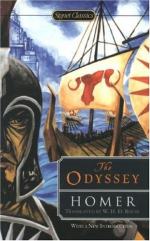And close behind him Odysseus entered the house in the guise of a beggar, a wretched man and an old, leaning on his staff, and clothed on with sorry raiment. And he sat down on the ashen threshold within the doorway, leaning against a pillar of cypress wood, which the carpenter on a time had deftly planed, and thereon made straight the line. And Telemachus called the swineherd to him, and took a whole loaf out of the fair basket, and of flesh so much as his hands could hold in their grasp, saying:
’Take and give this to the stranger, and bid him go about and beg himself of all the wooers in their turn, for shame is an ill mate of a needy man.’
So he spake, and the swineherd went when he heard that saying, and stood by and spake to him winged words:
’Stranger, Telemachus gives thee these and bids thee go about and beg of all the wooers in their turn, for, he says, “shame ill becomes a beggar man."’
Then Odysseus of many counsels answered him and said: ’King Zeus, grant me that Telemachus may be happy among men, and may he have all his heart’s desire!’
Therewith he took the gift in both hands, and set it there before his feet on his unsightly scrip. Then he ate meat so long as the minstrel was singing in the halls. When he had done supper, and the divine minstrel was ending his song, then the wooers raised a clamour through the halls; but Athene stood by Odysseus, son of Laertes, and moved him to go gathering morsels of bread among the wooers, and learn which were righteous and which unjust. Yet not even so was she fated to redeem one man of them from an evil doom. So he set out, beginning on the right, to ask of each man, stretching out his hand on every side, as though he were a beggar from of old. And they in pity gave him somewhat, and were amazed at the man, asking one another who he was and whence he came?
Then Melanthius, the goatherd, spake among them:
’Listen, ye wooers of the renowned queen, concerning this stranger, for verily I have seen him before. The swineherd truly was his guide hither, but of him I have no certain knowledge, whence he avows him to be born.’
So spake he, but Antinous rebuked the swineherd, saying: ’Oh notorious swineherd, wherefore, I pray thee, didst thou bring this man to the city? Have we not vagrants enough besides, plaguy beggars, kill-joys of the feast? Dost thou count it a light thing that they assemble here and devour the living of thy master, but thou must needs {*} call in this man too?’
{* [Greek] can hardly have a local meaning here. If retained, it must be nearly equivalent to [Greek], ’it seems,’ with a touch of irony. Cf. i.348. The v. 1. [Greek] is a simpler reading, but by no means certain.}




